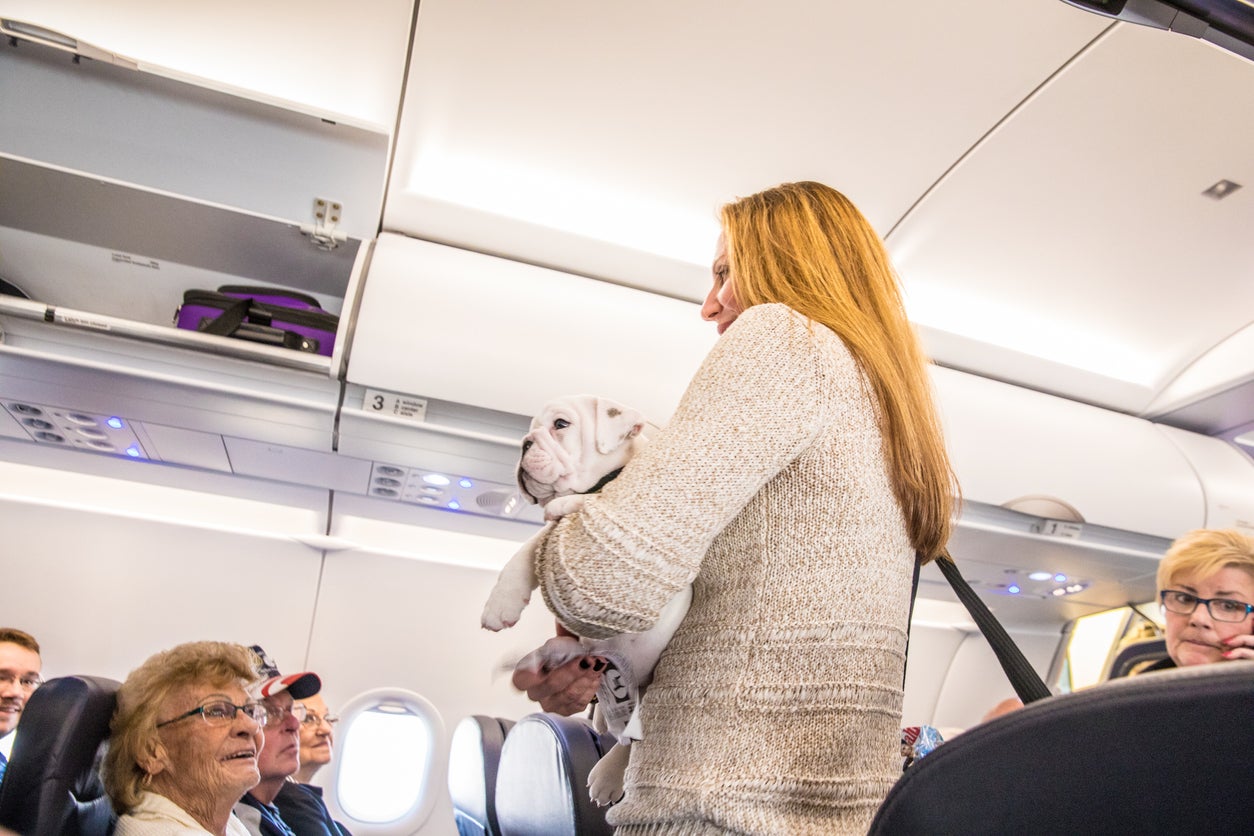US proposes crackdown on emotional support animals on flights
‘Airlines have reported increases in the number of behaviour-related service animal incidents on aircraft, including urinating, defecating, and biting’

Your support helps us to tell the story
From reproductive rights to climate change to Big Tech, The Independent is on the ground when the story is developing. Whether it's investigating the financials of Elon Musk's pro-Trump PAC or producing our latest documentary, 'The A Word', which shines a light on the American women fighting for reproductive rights, we know how important it is to parse out the facts from the messaging.
At such a critical moment in US history, we need reporters on the ground. Your donation allows us to keep sending journalists to speak to both sides of the story.
The Independent is trusted by Americans across the entire political spectrum. And unlike many other quality news outlets, we choose not to lock Americans out of our reporting and analysis with paywalls. We believe quality journalism should be available to everyone, paid for by those who can afford it.
Your support makes all the difference.Airlines will soon be able to ban all animals from aircraft cabins except properly trained dogs – and even they must have bladder control before they are allowed to fly.
The US Department of Transportation (DOT) is proposing new rules to crack down on passengers who pretend to need an “emotional support animal” simply to avoid paying to fly their pet.
At present, travellers can insist on the right to travel with emotional support animals. The DOT says: “Passengers have attempted to fly with many different unusual species of animals, such as a peacock, ducks, turkeys, pigs, iguanas, and various other types of animals as emotional support or service animals, causing confusion for airline employees and additional scrutiny for service animal users.”
Many commercial organisations have sprung up offering to certify the traveller as needing emotional support. By filling in an online questionnaire about conditions such as “irritability and/or agitation and/or anger, fatigue, restlessness,” and paying around $150 (£115), a certificate is issued that the airline is obliged to accept.
“Passengers wishing to travel with their pets may be falsely claiming that their pets are service animals so they can take their pet in the aircraft cabin or avoid paying pet fees charged by most airlines since airlines cannot charge service animal users a fee to transport service animals,” says the DOT.
“Airlines have reported increases in the number of behaviour-related service animal incidents on aircraft, including urinating, defecating, and biting.
“Disability advocates have voiced concerns that the use of these unusual service animals on aircraft erodes the public’s trust and confidence in service animals.
The proposed amendment says: “Other species of animals, whether wild or domestic, trained or untrained, are not service animals for the purposes of this definition.
“Passengers are increasingly bringing untrained service animals onboard aircraft and putting the safety of crew members, other passengers, and other service animals at risk.”
In 2017, Delta Air Lines carried an average of 700 “service animals” each day, with then number of “emotional support animals” rising by 63 per cent in a year.
The airline currently bars animals that are “growling, biting, jumping on passengers, flight attendants or staff, relieving themselves in the gate area or cabin, barking excessively and eating off seat back tray tables”.
The number of complaints about animals on flights has more than trebled in the four years to 2018.
Now the DOT intends to amend the US Air Carrier Access Act “to ensure that our air transportation system is safe for the travelling public and accessible to individuals with disabilities”.
The new rules separates service dogs from other creatures for the purposes of aviation.
A service animal is defined as “a dog that is individually trained to do work or perform tasks for the benefit of a qualified individual with a disability, including a physical, sensory, psychiatric, intellectual, or other mental disability.”
Passengers planning to travel with a service animal must fill in a form “attesting to the animal’s training and good behaviour”.
They must certify that the animal is in good health, and “has the ability either not to relieve itself on a long flight or to relieve itself in a sanitary manner”.
The creature must be “harnessed, leashed, or otherwise tethered”.
The DOT says “snakes, other reptiles, ferrets, rodents and spiders” are barred from airline cabins completely.
Delta also bans goats, frogs and salamanders.
Join our commenting forum
Join thought-provoking conversations, follow other Independent readers and see their replies
Comments